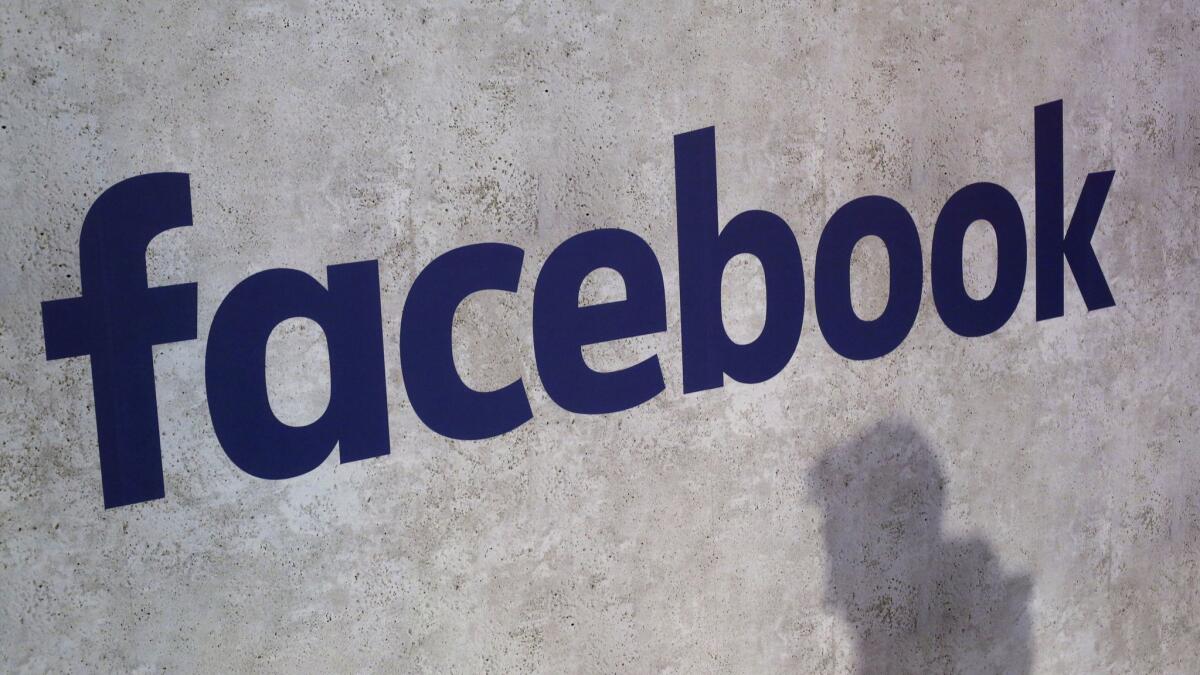Facebook bans Israeli company, saying it worked to disrupt elections

Facebook Inc. said Thursday it banned an Israeli company that ran an influence campaign aimed at disrupting elections in various countries and has canceled dozens of accounts engaged in spreading disinformation.
Nathaniel Gleicher, Facebook’s head of cybersecurity policy, told reporters that the tech giant had purged 65 Israeli accounts, 161 pages, dozens of groups and four Instagram accounts.
Facebook said that the people behind the network tried to conceal their identities but that the company discovered many were linked to the Archimedes Group, a Tel Aviv political consulting and lobbying firm that boasts of its social media skills and ability to “change reality.”
“It’s a real communications firm making money through the dissemination of fake news,” said Graham Brookie, director of the Digital Forensic Research Lab at the Atlantic Council, a think tank collaborating with Facebook to expose and explain disinformation campaigns.
He called Archimedes’ commercialization of tactics more commonly tied to governments such as Russia’s an emerging — and worrying — trend in the global spread of social media disinformation. “These efforts go well beyond what is acceptable in free and democratic societies,” Brookie said.
Gleicher described the pages as conducting “coordinated inauthentic behavior,” with accounts posing as certain political candidates, smearing opponents and presenting as local news organizations peddling supposedly leaked information.
“Our team assessed that because this group is primarily organized to conduct deceptive behavior, we are removing them from the platform and blocking them from coming back,” he added.
The activity appeared to be focused on sub-Saharan African countries but was also scattered in parts of Southeast Asia and Latin America — what Brookie called a “staggering diversity of regions” that pointed to the group’s sophistication.
The fake pages, pushing a steady stream of political news, racked up 2.8 million followers. Thousands of people expressed interest in attending at least one of the nine events organized by those behind the pages. Facebook could not confirm whether any of the events actually occurred. Some 5,000 accounts joined one or more of the fake groups.
Gleicher said the misleading accounts primarily aimed to influence people in Nigeria, Senegal, Togo, Angola, Niger and Tunisia.
The most significant audience engagement was generated in Malaysia, which has a vast media market and held a general election last year, according to Brookie and his team at the Atlantic Council.
Facebook said its investigations revealed that Archimedes had spent some $800,000 on fake ads, paid for in Brazilian, Israeli and U.S. currency. Gleicher said its deceptive activity dated back to 2012, with the most recent activity occurring last month.
Facebook has come under pressure to more aggressively and transparently tackle misinformation aimed at sowing division and confusion around elections, since the revelation that the company was slow to respond to Russian meddling in the 2016 U.S. election.
Thursday’s disclosure, which Facebook pointed to as proof of its accelerating “progress rooting out abuse,” underscored the extent to which private actors are leveraging the platform to meddle in elections and more broadly tap the “growing market for disinformation,” Brookie said.
But the company’s efforts to fight fake accounts are “often made in great haste,” said Jonathan Klinger from the Israeli Digital Rights Movement, and if Archimedes does have legitimate links to political parties and candidates, Facebook can expect a legal battle.
On its website, Archimedes, which presents itself as a consulting firm involved in campaigns for presidential elections, does not hide its efforts to manipulate public opinion. Rather, the company advertises it.
The site, featuring a montage of stock photos from Africa, Latin America and the Caribbean, boasts of its “own unique field within the social media realm” and its efforts to “take every advantage available in order to change reality according to our client’s wishes.”
Little information is available beyond its slogan, which is “winning campaigns worldwide,” and a vague blurb about the group’s “mass social media management” software, which it said enabled the operation of an “unlimited” number of online accounts.
The company did not immediately reply to a message seeking comment.
Archimedes’ chief executive is Elinadav Heymann, according to Swiss negotiations consultancy Negotiations.CH, where he is listed as one of the group’s consultants.
A biography posted to the company’s website describes him as the former director of the Brussels-based European Friends of Israel lobbying group, a former political advisor in Israel’s parliament and an ex-intelligence agent for the Israeli air force.
Heymann did not reply to messages left with Daniel Hardegger, Negotiations.CH’s managing director. Shortly after the Associated Press got in touch, Hardegger said that Heymann requested that his biography be removed from the site.






